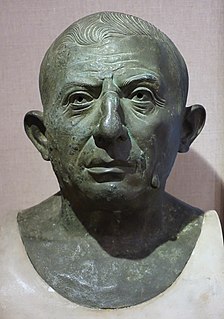Related Research Articles

The gens Pompeia was a plebeian family at ancient Rome, first appearing in history during the second century BC, and frequently occupying the highest offices of the Roman state from then until imperial times. The first of the Pompeii to obtain the consulship was Quintus Pompeius in 141 BC, but by far the most illustrious of the gens was Gnaeus Pompeius, surnamed Magnus, a distinguished general under the dictator Sulla, who became a member of the First Triumvirate, together with Caesar and Crassus. After the death of Crassus, the rivalry between Caesar and Pompeius led to the Civil War, one of the defining events of the final years of the Roman Republic.
The gens Octavia was a plebeian family at ancient Rome, which was raised to patrician status by Caesar during the first century BC. The first member of the gens to achieve prominence was Gnaeus Octavius Rufus, quaestor circa 230 BC. Over the following two centuries, the Octavii held many of the highest offices of the state; but the most celebrated of the family was Gaius Octavius, the grandnephew and adopted son of Caesar, who was proclaimed Augustus by the senate in 27 BC.
The gens Arria was a plebeian family at Rome, which occurs in history beginning in the final century of the Republic, and became quite prominent in imperial times. The first of the gens to achieve prominence was Quintus Arrius, praetor in 72 BC.

The gens Caecilia was a plebeian family at ancient Rome. Members of this gens are mentioned in history as early as the fifth century BC, but the first of the Caecilii who obtained the consulship was Lucius Caecilius Metellus Denter, in 284 BC. The Caecilii Metelli were one of the most powerful families of the late Republic, from the decades before the First Punic War down to the time of Augustus.
Caecina was the name of an Etruscan family of Volaterrae, one of the ancient cities of Etruria. Persons of this gens are first mentioned in the first century BC. Under the Empire the name is of frequent occurrence. As late as the reign of Honorius, we read of the poet Decius Albinus Caecina, residing at his villa in the neighborhood of Volaterrae; and until modern times there has been a family of this name at the modern Volterra. The family tomb of the Caecinae has been discovered in the neighborhood of Volterra; in this tomb there was found a beautiful sarcophagus, now in the Museum of Paris.
The gens Caelia was a plebeian family at ancient Rome. The nomen Caelius is frequently confounded with Coelius and Caecilius, with some individuals referred to as Caelius in manuscripts, while appearing as Coelius or Coilius on coins. Although the Caelii asserted their great antiquity, none of them attained any of the higher offices of the Roman state until the praetorship of Publius Caelius in 74 BC, and the first of this gens who obtained the consulship was Gaius Caelius Rufus in AD 17. The emperor Balbinus was a descendant of the Caelii.

The gens Memmia was a plebeian family at ancient Rome. The first member of the gens to achieve prominence was Gaius Memmius Gallus, praetor in 172 BC. From the period of the Jugurthine War to the age of Augustus they contributed numerous tribunes to the Republic.

The gens Maria was a plebeian family of Rome. Its most celebrated member was Gaius Marius, one of the greatest generals of antiquity, and seven times consul.
The gens Sextilia was a plebeian family at ancient Rome. The first member of this gens to achieve prominence was Gaius Sextilius, consular tribune in 379 BC. None of the family obtained the consulship, but they endured throughout Roman history from the early Republic into imperial times.

The gens Curtia was an ancient but minor noble family at Rome, with both patrician and plebeian branches. The only member of the gens invested with the consulship under the Republic was Gaius Curtius Philo, in 445 BC. A few Curtii held lesser magistracies during the Republic, and there were two consuls suffectus in imperial times. However, the gens is best remembered from a series of legends dating from the traditional founding of the city to the early Republic.
The gens Lucceia, occasionally Luceia or Luccia, was a plebeian family at Rome, which flourished during the final century of the Republic and under the early Empire.

The gens Munatia was a plebeian family at Rome. Members of this gens are first mentioned during the second century BC, but they did not obtain any of the higher offices of the Roman state until imperial times.
The gens Novia was a minor plebeian family at Rome. Members of this gens first appear during the final century of the Republic, but the first of the Novii to obtain the consulship was Decimus Junius Novius Priscus in AD 78.
The gens Oppia was an ancient Roman family, known from the first century of the Republic down to imperial times. The gens may originally have been patrician, as they supplied priestesses to the College of Vestals at a very early date, but all of the Oppii known to history were plebeians. None of them obtained the consulship until imperial times.
The gens Paccia, occasionally written Pactia, was a minor plebeian family at ancient Rome. Only a few members of this gens achieved distinction in the Roman state, of whom the most illustrious was Gaius Paccius Africanus, consul in AD 67.
The gens Rubria was a plebeian family at ancient Rome. Members of this gens are first mentioned in the time of the Gracchi, but they did not rise to prominence until imperial times. The first of the Rubrii to obtain the consulship was Rubrius Gallus, some time before AD 68.
The gens Sallustia, occasionally written Salustia, was a plebeian family at ancient Rome. Members of this gens are first mentioned in the time of Cicero, and from that time they attained particular distinction as statesmen and writers. The most illustrious of the family was the historian Gaius Sallustius Crispus, who wrote valuable works on the Jugurthine War and the Conspiracy of Catiline, which still exist.
The gens Seia was a minor plebeian family of equestrian rank at ancient Rome. Members of this gens are first mentioned in the time of Cicero, and a few of them held various magistracies under the late Republic and into imperial times.
The gens Silia was a plebeian family at ancient Rome. Members of this gens are mentioned as early as the fifth century BC, but first to hold the consulship was Publius Silius Nerva, in the time of Augustus. The Silii remained prominent until the time of the Severan dynasty, in the early third century.
The gens Statia was a minor plebeian family at ancient Rome. Members of this gens are first mentioned in the early decades of the Republic, but the name does not appear again in history until the time of Cicero. The Statii remained relatively undistinguished until the reign of Trajan, when Lucius Statius Aquila was raised to the consulship.
References
- ↑ Chase, pp. 118, 119, 139.
- ↑ Cicero, Pro Milone, 27.
- ↑ Cicero, Epistulae ad Quintum Fratrem, i. 1. § 6.
- ↑ Tacitus, Annales, iii. 67.
- ↑ Suetonius, "The Life of Tiberius", 61.
- 1 2 3 4 PIR, vol. III, p. 4.
- ↑ Tacitus, Annales, xvi. 28, 29, 33.
- ↑ Dictionary of Greek and Roman Biography and Mythology, vol. I, p. 82 ("Paconius Agrippinus").